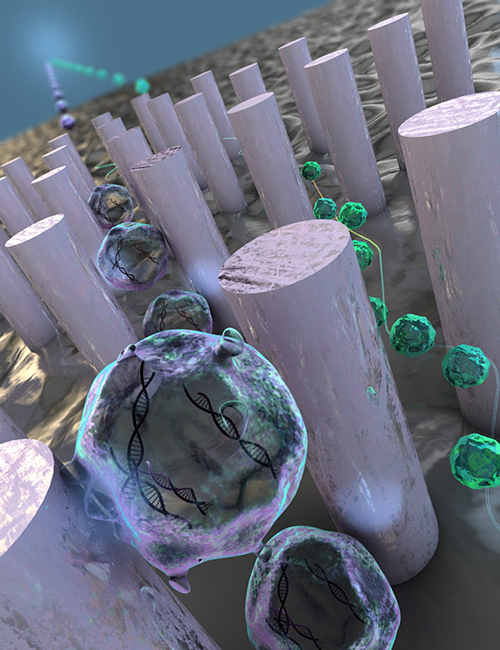
A collaborative team of scientists from IBM, Princeton University, and the Icahn School of Medicine at Mount Sinai have developed novel lab-on-a-chip technology that can, for the first time, separate biological particles at the nanoscale and possibly enable physicians to detect diseases such as cancer before symptoms appear. The new report—“Nanoscale lateral displacement arrays for the separation of exosomes and colloids down to 20 nm”—published today in Nature Nanotechnology, shows size-based separation of bioparticles down to the low nanometer (nm) scale, which allows investigators access to important particles such as DNA, viruses, and exosomes.
After separation, bioparticles can be analyzed by researchers looking to uncover signs of disease even before patients experience any physical symptoms and when the outcome from treatment is most positive. Until now, the smallest bioparticle that could be separated by size with on-chip technologies was about 50 times larger, for example, separation of circulating tumor cells from other biological components.
The research team was particular interested in isolating exosomes, as they are increasingly becoming viewed as valuable biomarkers for the diagnosis and prognosis of malignant tumors. Exosomes are typically released in easily accessible bodily fluids such as saliva, urine, or blood and represent a precious biomedical tool that can be used as less invasive liquid biopsies, to reveal the origin and nature of cancer.
“The ability to sort and enrich biomarkers at the nanoscale in chip-based technologies opens the door to understanding diseases such as cancer as well as viruses like the flu or Zika,” explained co-senior study author Gustavo Stolovitzky, Ph.D., program director of translational systems biology and nanobiotechnology at IBM Research. “This extra amount of time could allow physicians to make more informed decisions and when the prognosis for treatment options is most positive.”
The research team's results showed that they could separate and detect particles as small as 20 nm from smaller particles, that exosomes of size 100 nm and larger could be separated from smaller exosomes, and that separation can take place in spite of diffusion, a hallmark of particle dynamics at these small scales. Along with Mount Sinai, IBM plans to confirm their technology can pick up exosomes with cancer-specific biomarkers from patient liquid biopsies.
Mt. Sinai researchers hope that with the ability to sort bioparticles at the nanoscale that this new technology will provide novel methods intercept the messages carried by exosomes for cell-to-cell communications. This can elucidate important questions about the biology of diseases as well as pave the way to noninvasive and eventually affordable point-of-care diagnostic tools.
“When we are ahead of the disease, we usually can address it well—but if the disease is ahead of us, the journey is usually much more difficult. One of the important developments that we are attempting in this collaboration is to have the basic grounds to identify exosome signatures that can be there very early on before symptoms appear or before a disease becomes worse,” noted Carlos Cordon-Cardo, M.D., Ph.D., chair of the department of pathology at the Mount Sinai Health System and professor of pathology, genetics, and genomic sciences, and oncological sciences at the Icahn School of Medicine. “By bringing together Mount Sinai's domain expertise in cancer and pathology with IBM's systems biology experience and its latest nanoscale separation technology, the hope is to look for specific, sensitive biomarkers in exosomes that represent a new frontier to offering clues that might hold the answer to whether a person has cancer or how to treat it.”











